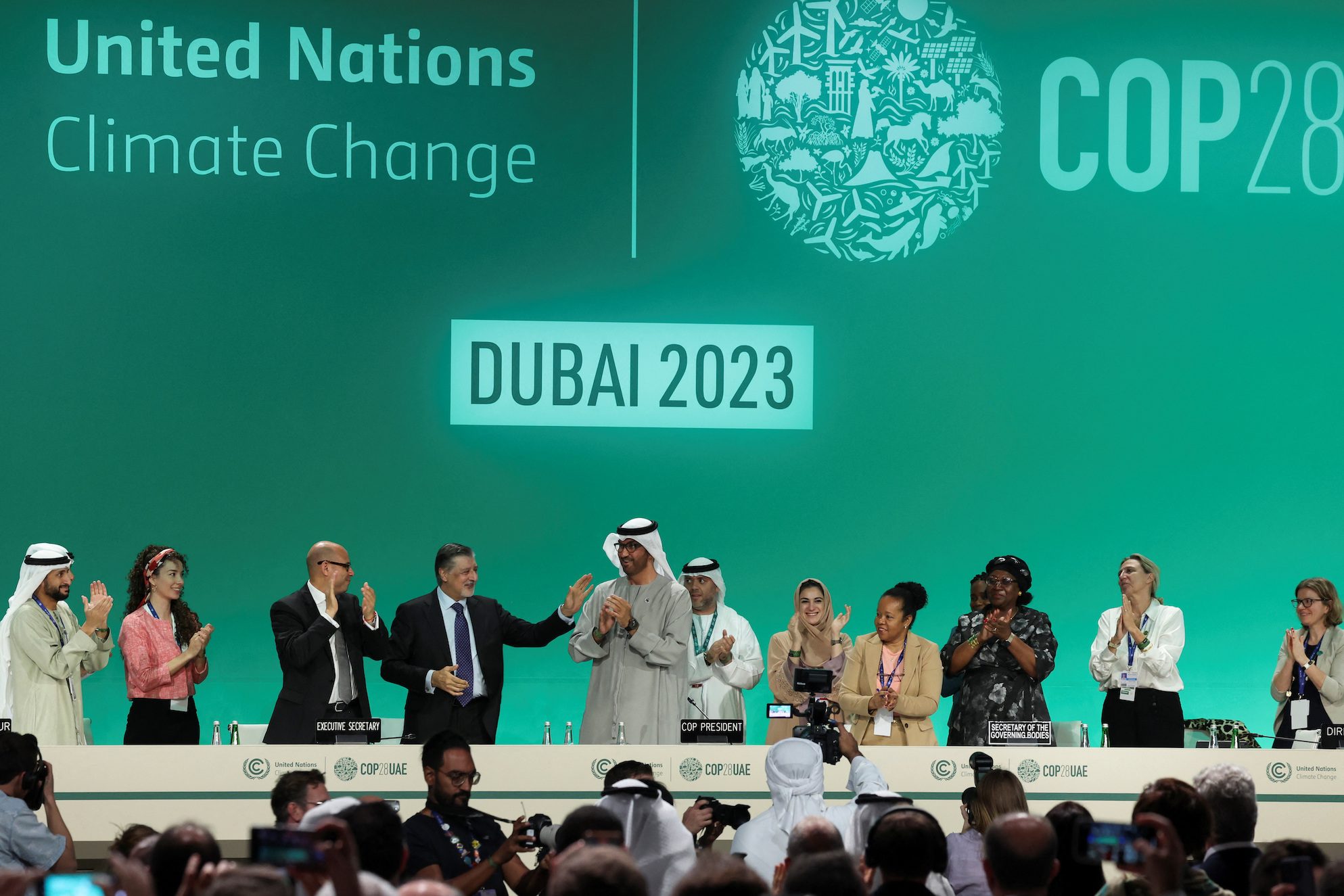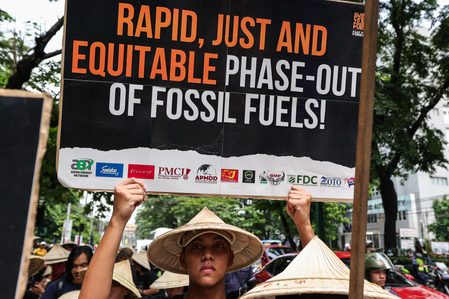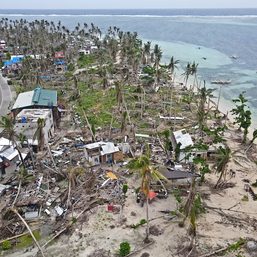SUMMARY
This is AI generated summarization, which may have errors. For context, always refer to the full article.

MANILA, Philippines – After banging down the gavel on the latest climate deal out of Dubai, COP28 President Sultan Al-Jaber addressed nations on Wednesday, December 13, hailing the plan that he said was “led by the science.”
“It is an enhanced, balanced but make no mistake, a historic package to accelerate climate action. It is the UAE Consensus,” Al-Jaber said after talks at the United Nations (UN) Climate Change Conference went into overtime on Tuesday, December 12 – the supposed last day of COP28.
Unlike an earlier text that did not refer to a “phaseout” of fossil fuels, the draft decision that was adopted by nations Wednesday called for “transitioning away from fossil fuels in energy systems, in a just, orderly, and equitable manner…so as to achieve net zero by 2050 in keeping with the science.”
“We have language on fossil fuel in our final agreement for the first time ever,” Al-Jaber said in his speech.
But Philippine civil society organizations present in Dubai said the decision text “falls short” of what the world needs amid the growing threats of climate change.
“While there have been improvements won by pressure from civic movements and parties alike, the new text still falls far short of what is the only acceptable action – a rapid, full, and equitable fossil fuel phaseout in line with 1.5°C,” said Gerry Arances, executive director of the Center for Energy, Ecology, and Development.
He said the text “limits even the phasedown of coal, fails to acknowledge necessary timelines, hails the notion of transition fuels…and leaves room for dangerous distractions.”
Jefferson Estela, the founding convenor of Youth Strike 4 Climate Philippines, agreed and called the final text “a dismal failure” in delivering the overwhelming demand at COP28 to phase out fossil fuels.
“While we welcome transitioning away from fossil fuels, it falls short to commit to complete fossil phaseout. When will we be doing it? When all island nations like the Pacific and the Philippines drowned already and disappeared? This COP failed,” he said.
According to Aksyon Klima Pilipinas’ John Leo Algo, despite attempts to delay or dispute it, the fossil fuel phaseout is “inevitable.”
“For the sake of current and future generations, we must use the next few years to build on this momentum, especially on pressuring developed countries to provide the one missing key that would unlock a just energy transition: sufficient climate finance,” said Algo, the national coordinator of the country’s largest civil society network for climate action.
During crunch time at COP28, Filipino climate activist Lidy Nacpil also zeroed in on the need to shore up climate finance flows.
Reacting a few hours before the deal was adopted, she slammed developed countries for “shamelessly [refusing]” to acknowledge their “historical and continuing responsibility for the climate crisis.”
“There cannot be ambition without equity, and no equity without the delivery of their full climate finance obligations,” said Nacpil, the coordinator of the Asian Peoples’ Movement on Debt and Development.
Minnie Anne Mata-Calub, the newly elected general secretary of the National Council of Churches in the Philippines (NCCP), said that their council is “gravely disappointed over the weak developments in COP28.”
“Our churches are witnesses to the real-time impacts of the climate crisis, and we’re seeing how communities in the Philippines are being pushed by the crisis to adapt because failure to do so would mean hunger, displacement, or even slow death for them,” Calub said. “This is why the failure of COP28 to address the significant need for support in loss and damage and reparations hits close to home.”
“We are also dismayed over the watering down of the commitment to phase out fossil fuels, in the plenary discussions and COP text. At this point in time, humanity deserves nothing short of the phaseout of the dirty industries that gave birth to the climate crisis,” Calub added.
Consensus?
Wednesday’s adoption of the draft decision on the outcome of the first-ever Global Stocktake was quickly met with a standing ovation, but the Alliance of Small Island States (AOSIS) was just as quick to voice its concern about the climate deal.
“We didn’t want to interrupt the standing ovation when we came into the room, but we are a little confused about what happened. It seems that you just gaveled the decisions and the small island developing states were not in the room,” Samoan chief negotiator Anne Rasmussen, whose country chairs the AOSIS, said as she addressed the COP presidency.

Rasmussen explained they were delayed in arriving at the plenary because they were coordinating with the members of the negotiating bloc.
“We have come to the conclusion that the course correction that is needed has not been secured. We have made an incremental advancement over business as usual, when what we really need is an exponential step change in our actions,” she added.
“It is not enough for us to reference the science and then make agreements that ignore what the science is telling us we need to do. This is not an approach that we should be asked to defend.”
UN Climate Change Executive Secretary Simon Stiell was asked in a separate press briefing whether there really was consensus during the adoption of the deal when a group was not in a room.
“There were no objections to what was gaveled, so agreement has been reached,” the UN climate chief simply answered.
Philippines secures seat in Loss and Damage Fund Board
The Philippines joined many countries that addressed the plenary on Wednesday following the adoption of the climate deal.
In its intervention, the Philippines “[noted] with concern” that the Global Stocktake “did not result in a stronger outcome” when it comes to equity and the principle of Common but Differentiated Responsibilities and Respective Capabilities (CBDRRC).
“That the [Global Goal on Adaptation] lacks explicit reference to CBDRRC and the mobility and displacement issues, while further noting that the decision text nevertheless refers to national circumstances,” Ambassador Leila Lora-Santos, the Philippines’ Second Deputy Permanent Representative to the United Nations, added.
Meanwhile, she said the Philippines was very pleased to see “the nexus of biodiversity and climate action” on the Global Stocktake and the Global Goal on Adaptation.
Watch the Philippines’ intervention here:

On loss and damage, the Philippines has been nominated as a representative of the Asia-Pacific Group in the Board of the Loss and Damage Fund in 2024. This comes as the Philippines – “a living testament to the effects of climate change” – also seeks to host the fund.
Algo said either position would provide the Philippines “a pivotal role in shaping the global [loss and damage] agenda for years to come,” but the country must prove its capacity to host the fund.
“There must be a cost-benefit analysis that it can present to show this capacity, considering that it would have to shoulder at least some of the costs for hosting meetings and other relevant operations. More importantly, it has to prove that it can practice what it preaches across all levels,” he added. – with reports from Reuters/Rappler.com
This story was produced as part of the 2023 Climate Change Media Partnership, a journalism fellowship organized by Internews’ Earth Journalism Network and the Stanley Center for Peace and Security.
Add a comment
How does this make you feel?










![[OPINION] Grading Marcos admin’s performance on the climate agenda](https://www.rappler.com/tachyon/2024/06/grading-marcos-performance-climate-agenda-june-25-2025.jpg?resize=257%2C257&crop=441px%2C0px%2C1080px%2C1080px)
![[OPINION] No room for ‘business as usual’ in era of climate emergency](https://www.rappler.com/tachyon/2024/06/no-room-business-as-usual-climate-change-june-25-2024.jpg?resize=257%2C257&crop_strategy=attention)
![[OPINION] Climate finance: A call to action for the Philippines](https://www.rappler.com/tachyon/2024/05/tl-climate-finance.jpg?resize=257%2C257&crop=458px%2C0px%2C1080px%2C1080px)







There are no comments yet. Add your comment to start the conversation.